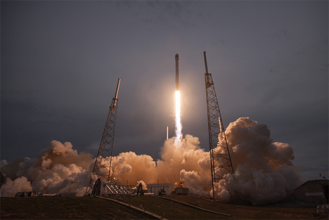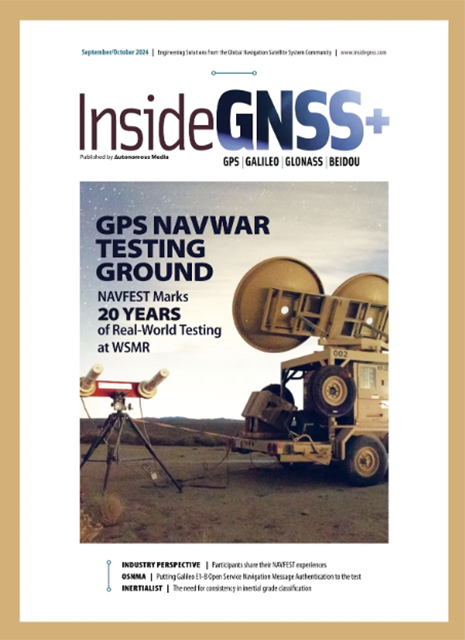The entrepreneurial space launch firm SpaceX won a head-to-head competition with United Launch Alliance (ULA) to secure its second GPS launch contract.
The launch of the GPS III spacecraft onboard a Falcon 9 rocket is expected to take place in 2019. The $96.5 million deal was officially announced March 14.
The entrepreneurial space launch firm SpaceX won a head-to-head competition with United Launch Alliance (ULA) to secure its second GPS launch contract.
The launch of the GPS III spacecraft onboard a Falcon 9 rocket is expected to take place in 2019. The $96.5 million deal was officially announced March 14.
The California-based firm, whose full name is Space Exploration Technologies Corp., was certified to handle military and intelligence satellite launches in 2015. It was soon squaring off against ULA, a 50-50 joint venture of Lockheed Martin and Boeing, for contracts to put a GPS III satellite in orbit in 2018. ULA declined to bid on that launch to the great frustration of the Air Force and some members of Congress. The only remaining bidder, SpaceX was awarded an $82.7 million contract for the launch last year.
"What is interesting is this (new) contract was awarded at a substantially higher price than the previous contract that went to SpaceX," said Todd Harrison, director of Defense Budget Analysis and of the Aerospace Security Project at the Center for Strategic and International Studies. "There’s not an obvious reason why because they’re launching the same satellite, a GPS III satellite. In the prior award, even though it was offered up for competition, SpaceX was the only bid. This time around ULA did put in a bid—but we kind of all knew they would lose based on price."
Harrison noted that SpaceX had access to prior contract data and was aware that ULA’s Atlas rocket cost significantly more. "I think it’s plausible that SpaceX simply knew that they had room to bid higher — and could still win."
Cost was widely suspected to be one of the reasons that ULA declined to compete for the earlier GPS III launch though one of the other issues mentioned at the time was concern over the availability of the RD-180 rocket engine.
The RD-180 is a Russian-made propulsion system that Sen. John McCain, R-Arizona, vehemently opposes as both a strategic risk and a form of financial support for Russian oligarchs. McCain, who is the chairman of the Senate Armed Services Committee, worked with House Majority Leader Kevin McCarthy, R-California, last year to introduce a bill banning the use of the engine. The Air Force, however, was not in favor of the move, saying an abrupt change could delay launches and add tens of millions, even hundreds of millions of dollars, to its costs — a particularly painful outcome given its spending limits at the time.
The Air Force also wanted to develop a total launch system, not just a replacement rocket engine for the Atlas.
"At the end of the defense authorization kind of negotiations between the House and the Senate, (the) Air Force, they eventually did provide the Air Force the flexibility that they were requesting to earnestly develop a replacement launch system not just a replacement engine — which is the argument the Air Force has always been making," said Mike Tierney, a senior consultant with Jacques and Associates, a consulting firm that specializes in defense, space/intelligence, homeland security and related industries.
On March 14 the Air Force released a draft Request for Proposals to do just that (Solicitation Number: FA8811-16-R-000X). Defense officials are looking to develop public private partnership agreements that will partially fund new and/or upgraded commercial launch systems that "quickly transition from the use of non-allied space launch engines" in return for commitments to provide future National Security Space launch services.
To help move away from the Russian engine, the Pentagon awarded engine development, public-private partnership agreements to SpaceX, Orbital ATK, ULA and Aerojet Rocketdyne in January and February 2016. To receive an award, each of these firms had to demonstrate that its proposed rocket propulsion system(s) was part of a planned or ongoing industry launch system upgrade or development in the Evolved Expendable Launch Vehicle (EELV) class of vehicles.
"I think we are at an inflection point when it comes to space launch because of the reintroduction of competition in the EELV program with SpaceX and because of the political imperative to stop using the RD-180 engine," said Harrison. "I think that we’re going to go through a transition for probably the next four or five years and, if all goes well, it will be a more price competitive market in the long run."
Lower prices would not only save money, Harrison said, they could enable the sort of creative space architectures that were being discussed for the GPS constellation not that long ago — the kind of creativity that could incorporate satellites of different sizes, or even spacecraft in different orbits.
"You have to constantly replenish these constellations so that gives you natural decision points to rethink the design of the constellation," Harrison told Inside GNSS. "I think absolutely, as the cost of launch goes down, I think there will be opportunities for the military to rethink these constellations and look at architectures, space architectures, that may not have been cost feasible in the past that might become cost feasible in the future."




